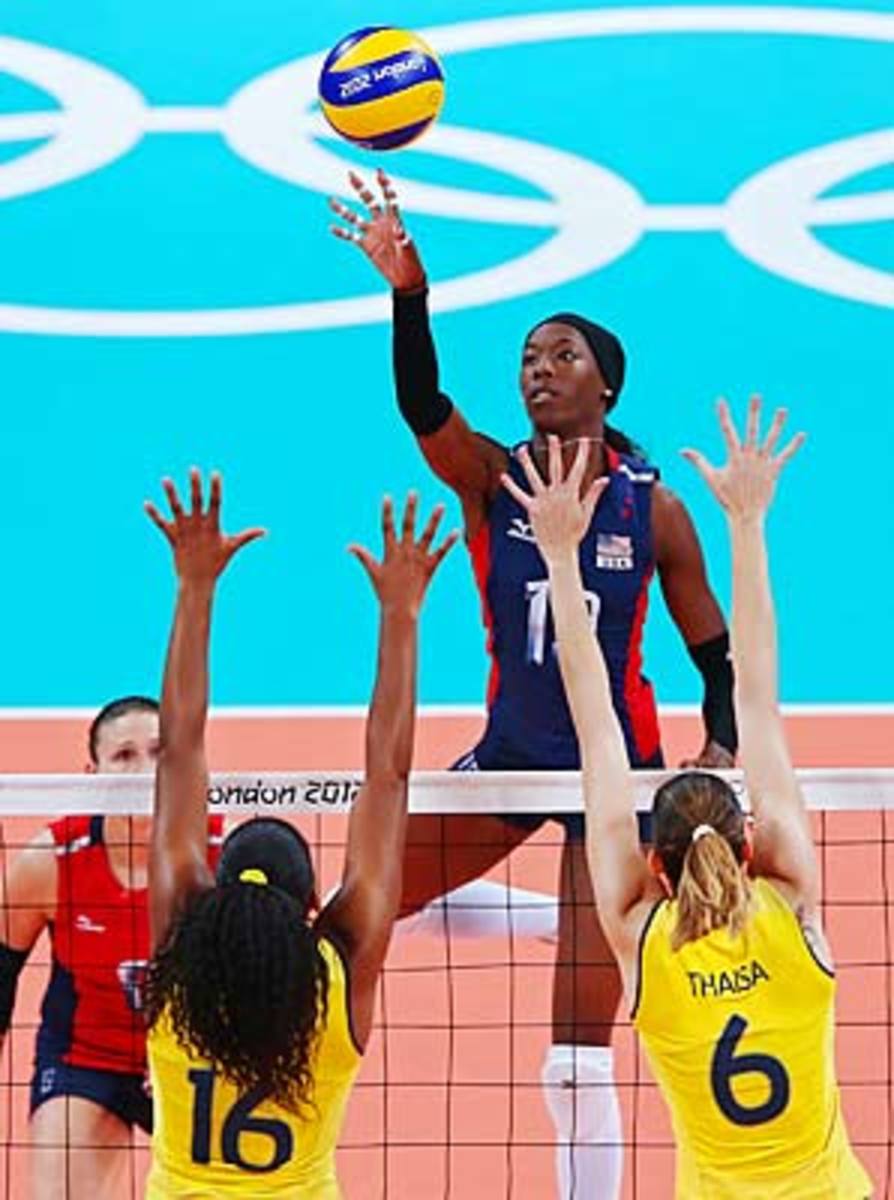Americans' good vibes fall short against Brazil in volleyball final
LONDON -- It was as if Fernanda Rodrigues were conducting a midair symphony. Her body suspended above the ground, her left arm swung one way, her right arm swung the other. With perfect timing and rhythm and precision, she met the volleyball at the apex of her jump. Windmilling her fist, she delivered a violent spike. On the other side of the net, the sextet of Americans obliged to keep the ball in play could only flail. The yellow and blue sphere deflected off of a few fingers and bounced on the ground. And, like that, Brazil had won a gold medal in women's volleyball.
The same two teams had met last week in preliminary play at Earl's Court. The Americans won 3-1. Today it was the reverse. With superior teamwork, superior defense, superior execution and enough digging to test the shred of their kneepads, the Brazilians came up with an Olympic effort today, rallying after losing the first set, and winning 11-25, 25-17, 25-20, 25-17. This was a repeat of the final game at the Beijing Olympics when Brazil beat the U.S. 3-1.
In addition to training together, many of the Brazilians play together on the same Sollys Osasco team. The unity was very much in evidence today. "What you saw today was a team winning, a true team," said Brazil's coach Jose Guimares. "It's a special group."
Brazil's triumph thwarted the Americans' attempt to win gold for the first time in this event. Ten times now, the U.S. has sent a women's team to the Games; ten times now, they have fared no better than silver. On some occasions, it was on account of injury. In other cases, it was on account of fielding a team that never coalesced. Today? The Americans simply couldn't confront an opponent that, after losing the first set, played close to perfection. "We weren't outworked," said coach Hugh McCutcheon, "but we were outplayed ... All you could do was weather the storm, but there wasn't any let-up." Added American veteran Logan Tom. "They won, they definitely raised their level ... but that doesn't mean it's not disappointing."
Disappointing on several levels. One: Today's result tempered the standout performance of Destinee Hooker, the 6-3 Texan responsible for almost a full third of the Americans points this tournament. A favorite parlor game of these Olympics entails imagining some of the most successful athletes in other sports. The other day at the tennis, a woman openly wondered whether Serena Williams -- with her singular cocktail of power/determination/hand-eye/speed -- couldn't be a standout lacrosse or field hockey player. Usain Bolt, we learned, will have a tryout with Manchester United soccer/football club in the near future. Watching Hooker earlier this week, Boston Celtics coach Doc Rivers wasn't alone in speculating that Hooker could have emulated her father and played professional basketball. But in the case of Hooker we do know how she would have fared in at least one other sport. At the University of Texas, she was a three-time NCAA champion in the high jump. In 2008, Hooker finished sixth at the Olympic trials in the high jump, narrowly missing the team. She decided then to devote herself full-time to volleyball. She was M.V.P. of the World Grand Prix professional volleyball circuit last year. And the consensus is that, at 24, she still hasn't reached the peak of her powers.
The other shame: At least in the U.S., an American gold would have enabled conventional volleyball to share in some of the hype garnered by the beach volleyball event here. With the sand and the bikinis and a frisson of sex, "beach" siphoned fans and attention and fans from "indoor." Misty May-Treanor and Kerry Walsh, we know. Hooker and Foluke Akinradeo and Lindsey Berg, less so. While U.S. players uttered the sanitized talking points when asked about the trendy cognate -- "The success of beach volleyball is great exposure for our entire sport" -- there is clearly a certain ambivalence. One suspects that will only deepen after today.
After Rodrigues' last winning spike, it unleashed an all-time great celebrations, one that puts any World Series-winning clubhouse to shame -- and one that augurs favorably for the vibe at the Rio Games when Brazil tries to go for a third straight gold on home soil in 2016. (And one that chapped some of the Americans.) As countless Brazilian flags turned the stands into a sea of green and yellow, winning players piled on to the referees chair, banged steel drums (that somehow passed through the metal detector), took head-first dives across the court and did a series of synchronized cartwheels. Jubilant players wept openly.
So, of course, did the Americans, if triggered by different emotions. Even after the medal ceremony, the eyes of many of the Americans were still rimmed in shades of red as they made their way to a dressing room, trying to figure out how a team that had previously dropped only two sets all tournament, dropped three today. "I still believe we're a gold medal team," says Berg, "and I'll believe it for the rest of time."
This time, though, Destinee was on their side. Destiny was not.






